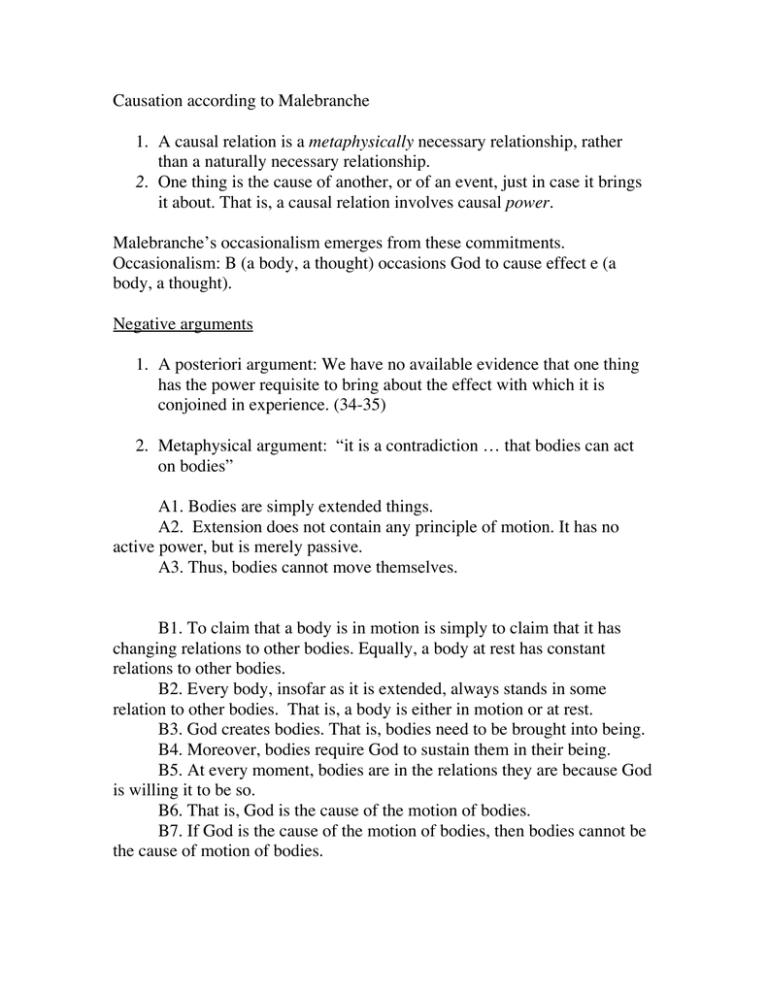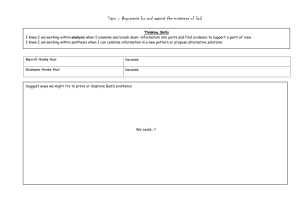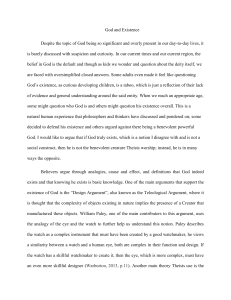Causation according to Malebranche 1. A causal relation is a
advertisement

Causation according to Malebranche 1. A causal relation is a metaphysically necessary relationship, rather than a naturally necessary relationship. 2. One thing is the cause of another, or of an event, just in case it brings it about. That is, a causal relation involves causal power. Malebranche’s occasionalism emerges from these commitments. Occasionalism: B (a body, a thought) occasions God to cause effect e (a body, a thought). Negative arguments 1. A posteriori argument: We have no available evidence that one thing has the power requisite to bring about the effect with which it is conjoined in experience. (34-35) 2. Metaphysical argument: “it is a contradiction … that bodies can act on bodies” A1. Bodies are simply extended things. A2. Extension does not contain any principle of motion. It has no active power, but is merely passive. A3. Thus, bodies cannot move themselves. B1. To claim that a body is in motion is simply to claim that it has changing relations to other bodies. Equally, a body at rest has constant relations to other bodies. B2. Every body, insofar as it is extended, always stands in some relation to other bodies. That is, a body is either in motion or at rest. B3. God creates bodies. That is, bodies need to be brought into being. B4. Moreover, bodies require God to sustain them in their being. B5. At every moment, bodies are in the relations they are because God is willing it to be so. B6. That is, God is the cause of the motion of bodies. B7. If God is the cause of the motion of bodies, then bodies cannot be the cause of motion of bodies. Positive Argument B4. Above demands an argument. 1. A body depends on God for its existence. 2. A body has no intrinsic power of its own (A2 above). 3. That is, remaining in existence requires the same power that coming into existence does. 4. A body cannot maintain itself in existence, since it lacks the requisite power. 5. God has the requisite power. 6. God sustains bodies in existence. That God causes motion in bodies is not yet the full story. Malebranche still needs to explain the regularities in nature. He does so by asserting that God prescribes for himself general laws which he abides by in willing what he does on the occasion of a body’s being in a certain mode. “God communicates His power to creatures and unites them among themselves solely by virtue of the fact that He makes their modalities occasional causes of effects which He produces Himself – occasional causes, I say, which determine the efficacy of His volitions in consequence of general laws that He has prescribed for Himself to make His conduct bear the character of His attributes and spread throughout his work the uniformity of action necessary to bind together all the parts that compose it and to extricate it from the confusion and irregularity of a kind of chaos in which minds could never understand anything.” (231)






